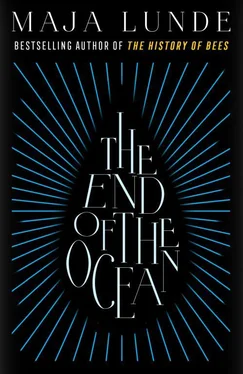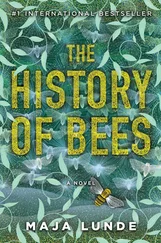All at once there were tears in her eyes and she turned around and ran.
Dammit!
“Lou!”
Everything was ruined now, I thought. The last days would be painful. What little time we had left would be turned into something ugly.
I ran behind her through the forest.
I was naked, barefoot. I stepped on something. A stone, it hurt like hell!
I had to stop, bend over to catch my breath.
And when I straightened up again, she was gone.
“Lou? Lou!”
Marguerite came after me. She had pulled on a sweat-shirt and shorts. She handed me the blanket. I wrapped myself up in it.
“Lou?” Marguerite called.
Again I was thirsty, so thirsty, my mouth so dry. Sweaty, my body was losing fluids with every passing minute.
Then we found her. She was standing completely still a short distance up the slope leading to the only knoll in the landscape.
I rushed towards her.
“Lou! Wait!”
But when she saw me, she started running again.
“Lou!”
She kept running up the hill.
I was breathing hard, the soles of my feet were already scratched, but I kept my eyes glued to her back as I ran after her.
I didn’t catch up with her until we had reached the top. The highest point in the landscape, a bump amidst all the flatness.
It was brighter here. The trees didn’t block out the pale evening sky.
I thought she was crying, because she was leaning forward. I thought she was doubled over and sobbing.
But then I discovered that she was busy investigating something on the ground. She knocked one hand against something. It sounded odd. Hollow.
I approached her cautiously.
Leaned down to see what she was looking at.
Large plastic containers. Two rows of them, half buried underground, almost hidden by dried vegetation.
She tried lifting one, but it slipped out of her hands.
I tried helping her and it was heavy. Slippery, solid, hard blue plastic between my hands.
Now Marguerite also joined us. She looked searchingly at Lou, and then at me.
“We’ve found something,” I said. “Lou found something.”
Marguerite took hold of another container. She was also startled by how heavy it was.
“Is there something in them?”
“Yes,” I said.
Because now we could hear the sound. A sloshing sound from within.
I put the container down on the ground and tried to remove the lid, but it wouldn’t budge. My hands were shaking. I found a stick, gave it a try, but it was too thick.
I found another one. It fit. I wriggled it down into the crack between the lid and the container.
Finally it opened.
We leaned over the container, all three of us.
The contents were packed in plastic. I pierced a hole in the packaging with the stick.
Lou poked one finger inside. Lifted it up. Tasted it.
I did the same thing, stuck my hand in, just the way I used to do in the ocean at home. But this time I tasted it.
Water. It was water.
The house is run-down, he is run-down, the grandchildren have only been here on one single occasion, there is no swimming pool and Trine has left for good. I don’t ask why.
We go out into the garden. He serves instant coffee, stirring with an unpolished silver spoon until the powder has dissolved.
I sit holding the mug, watching the steam form droplets along the inside of the rim. I hold the other hand over the top and feel how my palm becomes damp from the rising warmth.
“I thought it was you. There’s nobody else who could do something like that,” he says. “And then I heard you’d been home, that someone had seen Blue in the harbor, so then I knew for sure.”
“I know of a lot of other people who could have done something like that,” I say.
“In your world, sure. You live in another world.”
“We live in the same world.”
“Do we?”
He smiles.
“Do you think it’s ridiculous?” I ask. “That I dumped the ice?”
“No… I don’t think so. I don’t think anything you’ve ever done has been ridiculous.”
“But it hasn’t done any good,” I say.
“You don’t know how the world would have been if you hadn’t tried,” he says.
Neither of us speaks; we drink the coffee. Slowly it cools off and becomes lukewarm.
“You’re running,” I say.
“Every day,” he says. “Had to find something to do.”
“What about the garden? The house?”
“What about it?”
“That’s the kind of thing retired folk like to do.”
“I don’t like carpentry. Or gardening.”
He studies me over his cup. Again there’s laughter in him; his eyes are shining even though he is serious.
“You still want to laugh at me,” I say. “You can’t stop. People laugh at what they don’t understand.”
“No,” he says. “No, I don’t want to laugh at you.”
“Well, what is it, then?”
“Signe, don’t you understand anything?”
I look at him, don’t know what to say, because no, I really don’t understand a thing.
“Don’t you understand that… every time I went out running, ever since I started running, no, long before that, for my entire life… every time I left the house, all the houses I’ve lived in, all the hotel rooms, every time I left them… I wished, not always strongly, sometimes it’s only been a flicker, but lately stronger and stronger… every time I wished that when I came back from my trip or from work or from a run, that when I came back… you would be sitting on the front stoop?”
And then he hugs me again, leans forward and throws his arms around me. I am still holding the coffee cup in my hand, it comes between us—a warm, hard lump of pottery in the middle of the hug—I try to pull it out, we are both clumsy, two thirteen-year-olds.
But when we let go of each other, he keeps his hand on my arm, just leaves it there, as if to confirm that I’m real, and I don’t pull away.
“Why did you do it?” I ask.
“What?”
“Why did you approve the ice excavation?”
He draws a breath but doesn’t reply.
“Was it so I would come?” I continue. “Was it to provoke me? So I’d come looking for you? Because you knew that I wouldn’t be able to resist?”
He hesitates.
“No, Signe, no. I wish that was why. I would like to lie and say that was why. I wish I’d had that idea. You… you’re capable of doing something like that. Not me.”
“But why?”
“Because… I’m the same person I’ve always been. Because the price of electricity has gone down. Because it was a chance to increase revenues. A chance for continued security. And it probably doesn’t make any difference when I say that I’ve stopped the excavation now. Because the damage is already done.”
“Yes,” I say. “The damage is already done.” But the wind has gone out of my sails.
“And it doesn’t help that I’ve stopped the excavation?”
“I don’t know,” I say. “I don’t know yet.”
“…I’m sorry,” he says.
“Yes,” I say. “You’re sorry, but you’re still the same person you’ve always been.”
“I guess.” He nods. “Just older.”
“Me too,” I say.
We sit in silence for a while.
“But you’re aging well,” he says.
He startles me into a near-smile. “Was that a compliment?”
“No. A relevant piece of information.”
“Given the circumstances, I would say that it could be interpreted as a compliment.”
“So we’ll leave room for interpretation.”
“Interpretation?”
“Yes.”
“I’ll think about it.”
“Do.”
Again we fall silent.
“I brought ice,” I say then. “Twelve containers.”
Читать дальше










